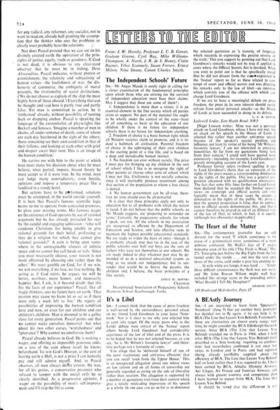IrTEAS LikrE INFRA
From: J. W. Hornby, Professor L. C. B. Gower, Graham Greene, Cyril Ray, Mike Williams- Thompson, A. North, J. R. de S. Honey, Claire Rayner, Tibor Szantuely, Susan Farrow. Ernest Milton, Nina Sieane, Canon Charles Stnyth.
The Independent Schools' Future
SIR,—Mr Angus Maude is surely right in calling for a closer examination of the fundamental principles upon which those who are striving for the survival of independent education must base their claims. May I suggest that these are some of them? : 1. Independence is more than a virtue; it is an essential element in the free society which all parties claim to support. No part of the national life ought to be wholly under the control of the state—least of all something so basic as the education of our children. If there is no future for independent schools there is no future for independent anything.
2. Freedom of choice is a basic human right which all Western societies claim to promote, and it is in- deed a hallmark of civilisation. Parental freedom of choice in the upbringing of their own children is the starting point of a free life, and is based on a deep and ineradicable human instinct.
3. No freedom can exist without variety. The price I must pay for bringing up my children in the sort of school which I like is to recognise the right of other parents to choose other sorts of school which I may not like. Uniformity is not socially cohesive, since it will inevitably produce resentment among that section of the population to whom a free choice is denied.
4. No human government can be all-wise; there- fore no state should ever be all-powerful. It is clear that these principles apply not only to education but to all problems with which the nation is faced. I do not believe that the public schools, as Mr Maude suggests, are 'preparing to surrender on terms.' Certainly the preparatory schools. for whom I speak, are not. All the schools in my association are recognised as efficient by the Department of Education and Science, and take effective steps to maintain the highest, possible educational standards. We are ready to widen the basis of entry—'though it is probably already true that (as in the case of the public schools) over half our boys are the sons of fathers who were not themselves at our schools. We arc ready indeed to play whatever part may be de- manded of us in a national educational system, as long as we retain our independence; but to sur- render that would be to betray the parents, the children and, I believe, the basic principles of a free society.
JAMES W. HORNBY Chairman Incorporated Association of Preparatory Schools Bronicote School, Scarborough, Yorks.


































 Previous page
Previous page